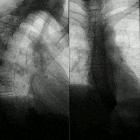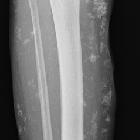Winiwater-Buerger-Krankheit



Buerger disease, also known as thromboangiitis obliterans, is a chronic, non-atherosclerotic, inflammatory, thrombotic arteritis found predominantly in young male smokers.
Clinical presentation
Patients may initially present with nonspecific symptoms such as hand and foot claudication, which eventually progresses to ischemic ulceration. A biopsy is often necessary to make the diagnosis because the imaging appearance and symptoms overlap with those of atherosclerosis and other connective tissue diseases.
Pathology
Although it more commonly affects medium and small vessels of the lower extremities, upper extremity involvement may also be seen. Venous involvement can be seen in 25% of cases.
Associations
Radiographic features
Angiography
Characteristic angiographic findings include:
- extensive arterial occlusive disease
- corkscrew collateral vessels
- more than one limb is usually affected
- predominantly the lower limbs
- intervening normal arteries
- sparing of the larger inflow vessels
Corkscrew collateral vessels are not, however, pathognomonic for Buerger disease as they may be seen in patients with connective tissue disease.
Differential diagnosis
Imaging differential considerations include:
- atherosclerosis
- connective tissue diseases
Siehe auch:
- Systemische Sklerodermie
- systemischer Lupus Erythematodes
- mixed connective tissue disease
- Atherosklerose
und weiter:

 Assoziationen und Differentialdiagnosen zu Endangiitis obliterans:
Assoziationen und Differentialdiagnosen zu Endangiitis obliterans:


